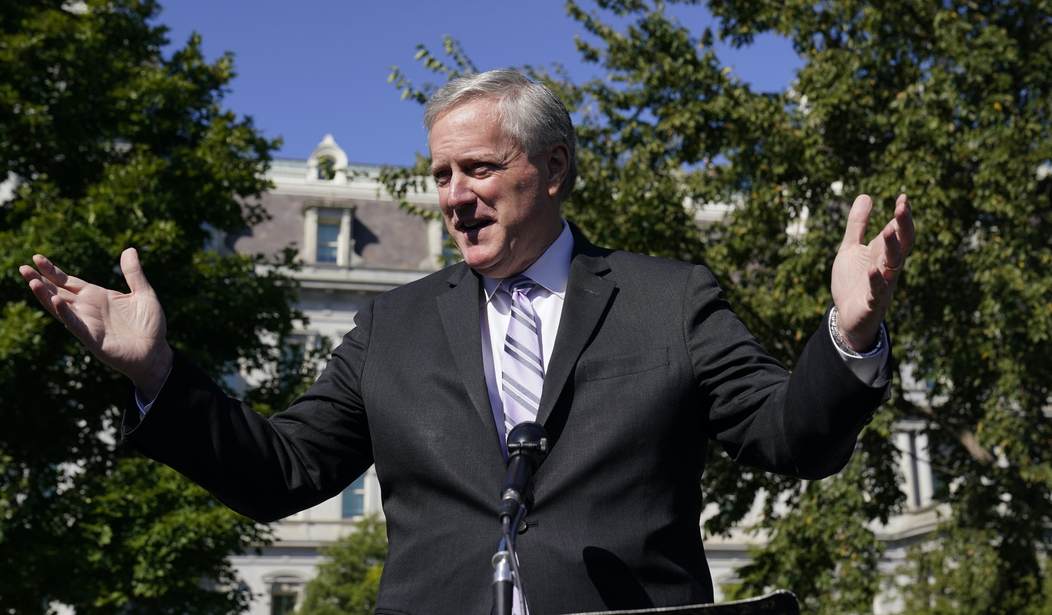Mark Meadows has made a request in the Fulton County indictment, of which he is listed as one of the 18 alleged co-conspirators. On Tuesday, he filed a motion to bring the charges out of Georgia and into federal court. This latest indictment--the fourth against former and potentially future President Donald Trump--was issued by a grand jury on Monday night for charges to do with the 2020 election.
Let the fun begin. Former Trump Chief of Staff, Mark Meadows legal team already submitted motion of removal https://t.co/Vbgnvz2tH6
— Rob O'Donnell (@odonnell_r) August 15, 2023
As the request, filed in the Northern District of Georgia reads in part:
Mr. Meadows has the right to remove this matter. The conduct giving rise to the charges in the indictment all occurred during his tenure and as part of his service as Chief of Staff. In these circumstances, federal law provides for prompt removal of a “criminal prosecution . . . commenced in a State court . . . against or directed to” a federal official, “in an official or individual capacity, for or relating to any act under color of [his] office.” 28 U.S.C. § 1442(a)(1). The removal statute “protect[s] the Federal Government from the interference with its operations that would ensue were a State able, for example, to arrest and bring to trial in a State court for an alleged offense against the law of the State, officers and agents of the Federal Government acting within the scope of their authority.”
Nothing Mr. Meadows is alleged in the indictment to have done is criminal per se: arranging Oval Office meetings, contacting state officials on the President’s behalf, visiting a state government building, and setting up a phone call for the President. One would expect a Chief of Staff to the President of the United States to do these sorts of things. And they have far less to do with the interests of state law than, for example, murder charges that have been successfully removed. E.g., In Re Neagle, 135 U.S. 1, 71 (1890); Tennessee v. Davis, 100 U.S. 257, 260–62 (1879).This is precisely the kind of state interference in a federal official’s duties that the Supremacy Clause of the U.S. Constitution prohibits, and that the removal statute shields against. See Neagle, 135 U.S. at 76 (holding that a federal official carrying out his duties “is not liable to answer in the courts of [a State]”).
Recommended
The filing argues throughout that Meadows was acting in his capacity as Trump's chief of staff. It also notes that "Mr. Meadows intends to file a motion to dismiss the indictment pursuant to Rule 12(b) of the Federal Rules of Criminal Procedure as soon as is feasible."
Rob O'Donnell shared a copy of the request, which attorney Leslie McAdoo Gordon also picked up on, diving into how Meadows' request is a matter of basic Constitutional law. Both Gordon and Meadows' filing make note of a key landmark case, McCulloch v. Maryland, from 1819.
The case dealt with the Supremacy Clause, which gives the federal constitution and federal laws precedence over state ones. States are thus prohibited from interfering with constitutional powers. It is the Supremacy Clause which Meadows mentions throughout his filing as why the case should be removed to federal court.
This is an important point of Constitutional law. It's found in 1 of the 1st cases 1st year law students study: McCulloch v. MD, decided in 1819. A holding of the case is that state actions cannot bind the federal govt, setting the stage for immunity for federal officers.
— Leslie McAdoo Gordon 🇺🇸 (@McAdooGordon) August 16, 2023
Federalism is an important feature of our Constitutional system; it divides power between the federal govt & the state govts, which sets them a bit at odds w/one another & preserves local issues for local elected officials. It's part of the liberty design of our federal republic.
— Leslie McAdoo Gordon 🇺🇸 (@McAdooGordon) August 16, 2023
Meadows has been indicted on two charges of Georgia's Racketeer Influenced and Corrupt Organizations (RICO) statute, for asking for phone numbers, which has raised concerns and eyebrows.
Mark Meadows asked for a phone number. @JennaEllisEsq gave legal advice.
— Rep. Jim Jordan (@Jim_Jordan) August 15, 2023
But somehow the Fulton County DA thinks this is a vast criminal conspiracy?
Totally ridiculous.
Maybe the DA should focus on the REAL crime, murders, and corruption happening in her county every day!
Promoting signature verification: A criminal act in Georgia. pic.twitter.com/1tZjXndat5
— Charlie Kirk (@charliekirk11) August 15, 2023
Asking for phone numbers: CRIMINAL CONSPIRACY pic.twitter.com/B0IFLBKOYX
— Charlie Kirk (@charliekirk11) August 15, 2023
The state of Georgia criminally indicted the former president of the United States for tweeting that people should turn on the television.
— Sean Davis (@seanmdav) August 15, 2023
They criminally indicted the White House chief of staff for asking for a phone number.
And they criminally indicted the former GOP state…

























Join the conversation as a VIP Member